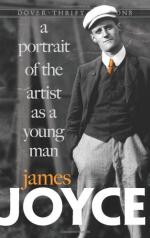—It’s a stinking mean thing, that’s what it is, said Fleming in the corridor as the classes were passing out in file to the refectory, to pandy a fellow for what is not his fault.
—You really broke your glasses by accident, didn’t you? Nasty Roche asked.
Stephen felt his heart filled by Fleming’s words and did not answer.
—Of course he did! said Fleming. I wouldn’t stand it. I’d go up and tell the rector on him.
—Yes, said Cecil Thunder eagerly, and I saw him lift the pandy-bat over his shoulder and he’s not allowed to do that.
—Did they hurt you much? Nasty Roche asked.
—Very much, Stephen said.
—I wouldn’t stand it, Fleming repeated, from Baldyhead or any other Baldyhead. It’s a stinking mean low trick, that’s what it is. I’d go straight up to the rector and tell him about it after dinner.
—Yes, do. Yes, do, said Cecil Thunder.
—Yes, do. Yes, go up and tell the
rector on him, Dedalus, said Nasty
Roche, because he said that he’d come in tomorrow
again and pandy you.
—Yes, yes. Tell the rector, all said.
And there were some fellows out of second of grammar listening and one of them said:
—The senate and the Roman people declared that Dedalus had been wrongly punished.
It was wrong; it was unfair and cruel; and, as he sat in the refectory, he suffered time after time in memory the same humiliation until he began to wonder whether it might not really be that there was something in his face which made him look like a schemer and he wished he had a little mirror to see. But there could not be; and it was unjust and cruel and unfair.
He could not eat the blackish fish fritters they got on Wednesdays in lent and one of his potatoes had the mark of the spade in it. Yes, he would do what the fellows had told him. He would go up and tell the rector that he had been wrongly punished. A thing like that had been done before by somebody in history, by some great person whose head was in the books of history. And the rector would declare that he had been wrongly punished because the senate and the Roman people always declared that the men who did that had been wrongly punished. Those were the great men whose names were in Richmal Magnall’s Questions. History was all about those men and what they did and that was what Peter Parley’s Tales about Greece and Rome were all about. Peter Parley himself was on the first page in a picture. There was a road over a heath with grass at the side and little bushes: and Peter Parley had a broad hat like a protestant minister and a big stick and he was walking fast along the road to Greece and Rome.




